Related Research Articles
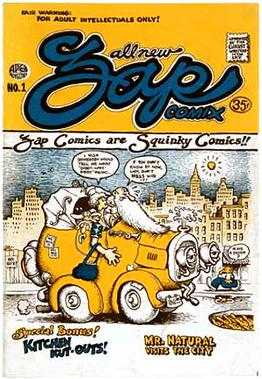
Underground comix are small press or self-published comic books that are often socially relevant or satirical in nature. They differ from mainstream comics in depicting content forbidden to mainstream publications by the Comics Code Authority, including explicit drug use, sexuality, and violence. They were most popular in the United States in the late 1960s and 1970s, and in the United Kingdom in the 1970s.

Zap Comix is an underground comix series which was originally part of the youth counterculture of the late 1960s. While a few small-circulation self-published satirical comic books had been printed prior to this, Zap became the model for the "comix" movement that snowballed after its release. The title itself published 17 issues over a period of 46 years.
Manuel Rodriguez, better known as Spain or Spain Rodriguez, was an American underground cartoonist who created the character Trashman. His experiences on the road with the motorcycle club, the Road Vultures M.C., provided inspiration for his work, as did his left-wing politics. Strongly influenced by 1950s EC Comics illustrator Wally Wood, Spain pushed Wood's sharp, crisp black shadows and hard-edged black outlines into a more simplified, stylized direction. His work also extended the eroticism of Wood's female characters.
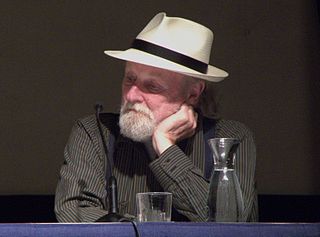
Gilbert Shelton is an American cartoonist and a key member of the underground comix movement. He is the creator of the iconic underground characters The Fabulous Furry Freak Brothers, Fat Freddy's Cat, and Wonder Wart-Hog.
The Print Mint, Inc. was a major publisher and distributor of underground comix based in the San Francisco Bay Area during the genre's late 1960s-early 1970s heyday. Starting as a retailer of psychedelic posters, the Print Mint soon evolved into a publisher, printer, and distributor. It was "ground zero" for the psychedelic poster. The Print Mint was originally owned by poet Don Schenker and his wife Alice, who later partnered in the business with Bob and Peggy Rita.

Last Gasp is a San Francisco–based book publisher with a lowbrow art and counterculture focus. Owned and operated by Ron Turner, for most of its existence Last Gasp was a publisher, distributor, and wholesaler of underground comix and books of all types.
Paul Mavrides is an American artist, best known for his critique-laden comics, cartoons, paintings, graphics, performances and writings that encompass a disturbing yet humorous catalog of the social ills and shortcomings of human civilization. Mavrides worked with underground comix pioneer Gilbert Shelton on The Fabulous Furry Freak Brothers from 1978 to 1992. Mavrides has been noted for "adding new dimensions to the political comic" in the underground comix press of the 1970s and '80s.

Kitchen Sink Press was a comic book publishing company founded by Denis Kitchen in 1970. Kitchen Sink Press was a pioneering publisher of underground comics, and was also responsible for numerous republications of classic comic strips in hardcover and softcover volumes. One of their best-known products was the first full reprint of Will Eisner's The Spirit—first in magazine format, then in standard comic book format. The company closed in 1999.

Jay Patrick Lynch was an American cartoonist who played a key role in the underground comix movement with his Bijou Funnies and other titles. He is best known for his comic strip Nard n' Pat and the running gag Um tut sut. His work is sometimes signed Jayzey Lynch. Lynch was the main writer for Bazooka Joe comics from 1967 to 1990; he contributed to Mad, and in the 2000s expanded into the children's book field.
Rory Hayes was an American underground cartoonist in the late 1960s and early 1970s. His comics were drawn in an expressionistic, primitivist style and usually dealt with grim subject matter such as paranoia, violent crime, and drug abuse. In addition to his own titles, Bogeyman and Cunt Comics, he was published in many of the most prominent comics in the underground scene, including Bijou Funnies and Arcade.

Mr. Natural is a comic book character created and drawn by 1960s counterculture and underground comix artist Robert Crumb. First appearing in Yarrowstalks (1967), the character gained a following during the emergence of underground comix in the 1960s and 1970s, and has been extensively merchandised in various products.

Anarchy Comics is a series of underground comic books published by Last Gasp between 1978 and 1987, as part of the underground comix subculture of the era. Edited by Jay Kinney (#1-3) and Paul Mavrides (#4), regular contributors to Anarchy Comics included Melinda Gebbie, Clifford Harper, and Spain Rodriguez, as well as Kinney and Mavrides.
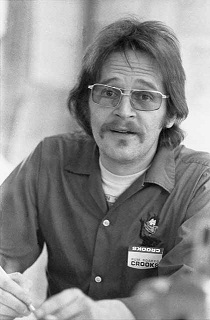
Dave Sheridan was an American cartoonist and underground comix artist. He was the creator of Dealer McDope and collaborated with Gilbert Shelton and Paul Mavrides on The Fabulous Furry Freak Brothers. As creative partner with fellow underground creator Fred Schrier, using the name "Overland Vegetable Stagecoach," they worked on Mother's Oats Funnies, published by Rip Off Press from 1970 to 1976.

Diane Robin Noomin was an American comics artist associated with the underground comics movement. She is best known for her character DiDi Glitz, who addresses transgressive social issues such as feminism, female masturbation, body image, and miscarriages.
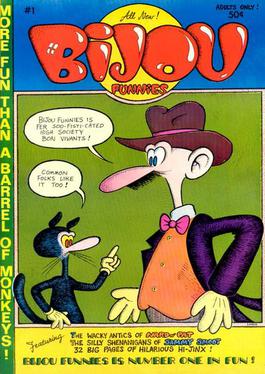
Bijou Funnies was an American underground comix magazine which published eight issues between 1968 and 1973. Edited by Chicago-based cartoonist Jay Lynch, Bijou Funnies featured strong work by the core group of Lynch, Skip Williamson, Robert Crumb, and Jay Kinney, as well as Art Spiegelman, Gilbert Shelton, Justin Green, and Kim Deitch. Bijou Funnies was heavily influenced by Mad magazine, and, along with Zap Comix, is considered one of the titles to launch the underground comix movement.
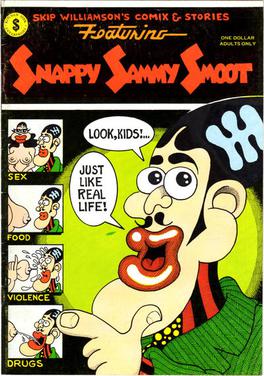
Snappy Sammy Smoot is an American underground comix character created by Skip Williamson in 1968. A counterculture Candide who never loses his innocence, Snappy Sammy Smoot appeared in his own strips in a number of comix titles, most notably Bijou Funnies, Comix Book, and Blab!. Cultural critic David Manning White wrote about the strip, "But what is. .. interesting about 'Snappy Sammy Smoot' is that it manages to be politically radical at the same time it is satirical and funny", and that it is "one of more highly stylized in the field".

Donald Richard Donahue was a comic book publisher, operating under the name Apex Novelties, one of the instigators of the underground comix movement in the 1960s.

Young Lust was an underground comix anthology published sporadically from 1970 to 1993. The title, which parodied 1950s romance comics such as Young Love, was noted for its explicit depictions of sex. Unlike many other sex-fueled underground comix, Young Lust was generally not perceived as misogynistic. Founding editors Bill Griffith and Jay Kinney gradually morphed the title into a satire of societal mores. According to Kinney, Young Lust "became one of the top three best-selling underground comix, along with Zap Comix and The Fabulous Furry Freak Brothers".

Company & Sons was an early underground comix publisher based in San Francisco, ran by John Bagley. The company operated from 1970 to 1973, publishing a total of 15 titles, all but one of them consisting of a single issue.
Willy Murphy was an American underground cartoonist. Murphy's humor focused on hippies and the counterculture. His signature character was Arnold Peck the Human Wreck, "a mid-30s beanpole with wry observations about his own life and the community around him." Murphy's solo title was called Flamed-Out Funnies; in addition, he contributed to such seminal underground anthologies as Arcade, Bijou Funnies, and San Francisco Comic Book, as well as the National Lampoon.
References
- ↑ Dooley, Michael Patrick; Heller, Steven, eds. (June 30, 2005). The Education of a Comics Artist. New York, NY: Skyhorse Publishing. ISBN 1-58115-408-9.
- ↑ Pahls, Marty. "Introduction," The Best of Bijou Funnies (inks Books/Quick Fox, 1975).
- ↑ Sabin, Roger (1996). "Going underground" . Comics, Comix & Graphic Novels: A History Of Comic Art. London, United Kingdom: Phaidon Press. pp. 92, 94–95, 103–107, 110, 111, 116, 119, 124–126, 128. ISBN 0-7148-3008-9.
- ↑ Fox, M. Steven. "Bijou Funnies," ComixJoint. Accessed Oct. 21, 2016.
- ↑ Kerekes, David. "Thrill to Stories of Graphic Lust! Two Decades of Pornographic Comic Books", in Critical Vision: Random Essays & Tracts Concerning Sex, Religion, Death (Critical Vision, 1995), p. 10.
- ↑ Sacks, Jason; Dallas, Keith (2014). American Comic Book Chronicles: The 1970s. TwoMorrows Publishing. p. 33. ISBN 978-1605490564.
- ↑ Kinney, quoted in "Gallery: Cultural Revolution Young Lust comix from 1977 (NSFW!)," The Shanghaist (March 3, 2012).
